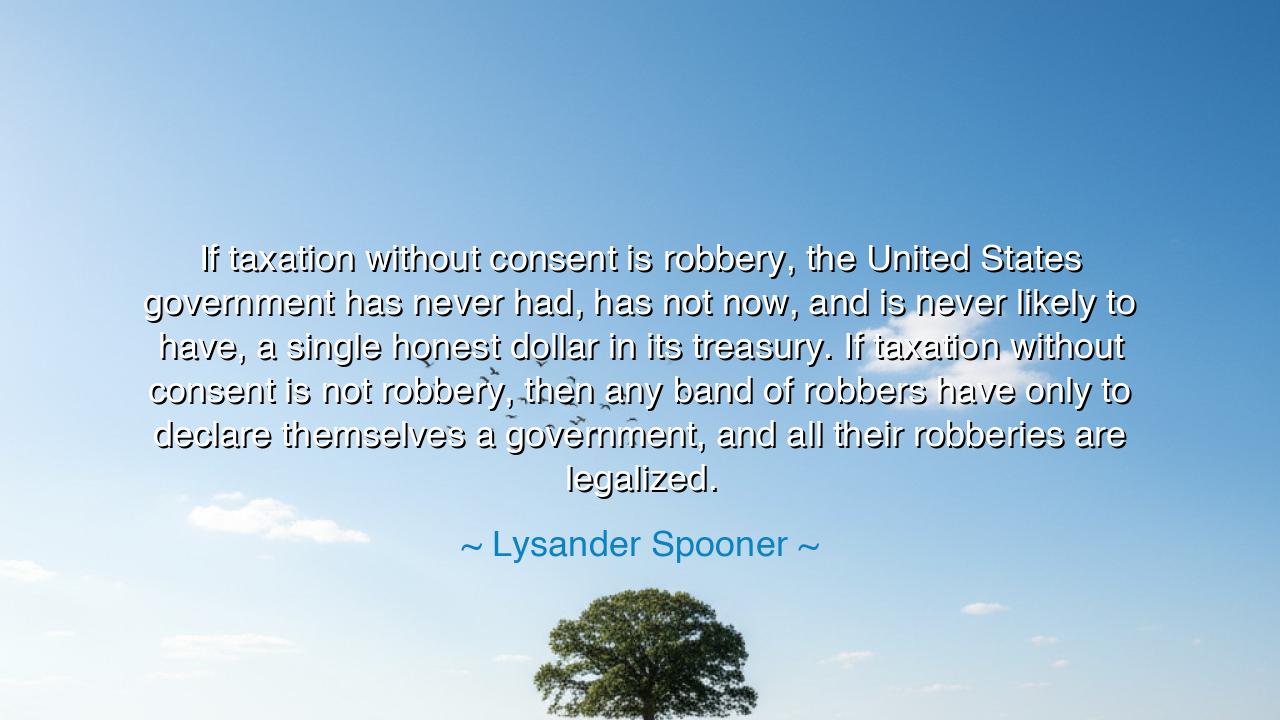
If taxation without consent is robbery, the United States
If taxation without consent is robbery, the United States government has never had, has not now, and is never likely to have, a single honest dollar in its treasury. If taxation without consent is not robbery, then any band of robbers have only to declare themselves a government, and all their robberies are legalized.






"If taxation without consent is robbery, the United States government has never had, has not now, and is never likely to have, a single honest dollar in its treasury. If taxation without consent is not robbery, then any band of robbers have only to declare themselves a government, and all their robberies are legalized." – Lysander Spooner
Thus spoke Lysander Spooner, a man of fiery intellect and unyielding conviction, whose words pierced the heart of political hypocrisy. In this declaration, Spooner strikes at the foundation of power itself. He challenges the notion that authority alone can sanctify what would otherwise be theft, reminding us that consent is the soul of justice. To him, if the government extracts wealth from its people without their voluntary agreement, it commits the very crime it condemns in others. And if mere labels—“law,” “state,” “nation”—can transform coercion into righteousness, then morality itself becomes the servant of might.
To understand the origin of this quote, one must look to the 19th century, an era of rebellion and reform. Spooner, a lawyer and radical thinker, lived through the turbulence of post-revolutionary America, when questions of freedom and government still burned hot. He opposed slavery, yes, but also opposed any form of involuntary servitude—including the servitude of taxation without individual consent. A true libertarian before the term had its modern shape, he believed that natural law—the inborn right of every person to life, liberty, and property—was higher than any constitution or decree. His words echo not against the government of his day alone, but against all times when rulers mistake dominion for justice.
Spooner’s philosophy calls to mind the spirit of the American Revolution, whose cry “no taxation without representation” ignited the fires of independence. Yet Spooner goes further still. Representation, he argues, is no true substitute for consent. A vote cast under a system one did not choose cannot sanctify its decrees. He reminds us that true freedom is not the right to choose masters, but the right to live without them. It is a warning that democracy itself, if untethered from moral consent, can become as oppressive as any monarchy.
Consider the story of Mahatma Gandhi, who, centuries later, waged a moral war against another empire that taxed and ruled without the consent of the governed. Through nonviolent resistance, he proved that legitimacy does not flow from power, but from conscience. When Gandhi and his followers defied the British salt tax—refusing to pay for what the earth freely gives—they echoed Spooner’s truth: that unjust laws and coerced tribute are forms of robbery cloaked in legality. The empire that prided itself on civilization was unmasked by the quiet dignity of those who would not consent to theft, even when it was called law.
Yet Spooner’s challenge is not only to governments—it is to each of us. How often do we justify wrongdoing because it wears the seal of approval? How often do we surrender our moral judgment to the machinery of authority? His words remind us that truth is not determined by decree. Whether it is a monarch’s tax, a dictator’s order, or a majority’s vote, coercion remains coercion. Power may compel obedience, but it can never create righteousness. The true measure of justice lies not in the hand that holds the sword, but in the heart that wields it.
At its core, Spooner’s quote is a defense of moral sovereignty—the sacred right of every soul to govern itself. He dares us to see beyond systems and titles, to recognize that the difference between a ruler and a robber lies only in whether we have chosen to give or have been forced to yield. When men forget this truth, tyranny rises not by conquest, but by consent withdrawn in silence. The slow death of liberty begins when people stop asking whether the law is just, and start assuming that it must be.
The lesson, then, is eternal: consent is the breath of freedom. Without it, all government, however polished, becomes mere organized plunder. We must guard our conscience as jealously as our property, for it is the only defense against sanctified corruption. To live by Spooner’s wisdom is to be vigilant—to question authority, to understand before obeying, to give not out of fear but from choice.
And so, the practical actions are clear. Seek to understand every power that governs you. Do not confuse legality with morality. Stand firm when conscience tells you that a law is unjust. Let your consent be the measure of your loyalty, not fear or convenience. For the day you surrender your right to say “no,” you have already paid the highest tax of all—the forfeiture of your freedom.






AAdministratorAdministrator
Welcome, honored guests. Please leave a comment, we will respond soon